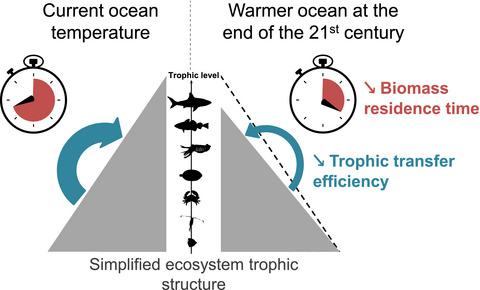当前位置:
X-MOL 学术
›
Glob. Change Biol.
›
论文详情
Our official English website, www.x-mol.net, welcomes your feedback! (Note: you will need to create a separate account there.)
Climate change undermines the global functioning of marine food webs.
Global Change Biology ( IF 11.6 ) Pub Date : 2019-12-04 , DOI: 10.1111/gcb.14944 Hubert du Pontavice 1, 2 , Didier Gascuel 1 , Gabriel Reygondeau 2, 3, 4 , Aurore Maureaud 5 , William W L Cheung 2
Global Change Biology ( IF 11.6 ) Pub Date : 2019-12-04 , DOI: 10.1111/gcb.14944 Hubert du Pontavice 1, 2 , Didier Gascuel 1 , Gabriel Reygondeau 2, 3, 4 , Aurore Maureaud 5 , William W L Cheung 2
Affiliation

|
Sea water temperature affects all biological and ecological processes that ultimately impact ecosystem functioning. In this study, we examine the influence of temperature on global biomass transfers from marine secondary production to fish stocks. By combining fisheries catches in all coastal ocean areas and life-history traits of exploited marine species, we provide global estimates of two trophic transfer parameters which determine biomass flows in coastal marine food web: the trophic transfer efficiency (TTE) and the biomass residence time (BRT) in the food web. We find that biomass transfers in tropical ecosystems are less efficient and faster than in areas with cooler waters. In contrast, biomass transfers through the food web became faster and more efficient between 1950 and 2010. Using simulated changes in sea water temperature from three Earth system models, we project that the mean TTE in coastal waters would decrease from 7.7% to 7.2% between 2010 and 2100 under the 'no effective mitigation' representative concentration pathway (RCP8.5), while BRT between trophic levels 2 and 4 is projected to decrease from 2.7 to 2.3 years on average. Beyond the global trends, we show that the trophic transfer efficiencies and BRTs may vary substantially among ecosystem types and that the polar ecosystems may be the most impacted ecosystems. The detected and projected changes in mean TTE and BRT will undermine food web functioning. Our study provides quantitative understanding of temperature effects on trophodynamic of marine ecosystems under climate change.
中文翻译:

气候变化破坏了海洋食物网的全球功能。
海水温度影响所有最终影响生态系统功能的生物和生态过程。在这项研究中,我们研究了温度对从海洋二次生产到鱼类种群的全球生物量转移的影响。通过结合所有沿海海洋地区的渔获量和被开发海洋物种的生活史特征,我们提供了两个营养传递参数的全球估算值,这些参数决定了沿海海洋食物网中的生物质流量:营养传递效率(TTE)和生物质停留时间(BRT)在食物网中。我们发现,在热带生态系统中,生物质的转移效率不如在水域较凉爽的地区更快。相比之下,在1950年至2010年之间,通过食物网的生物质转移变得更快,更有效。使用来自三种地球系统模型的模拟海水温度变化,我们预计,在“无有效缓解”代表性浓度路径(RCP8.5)下,沿海水域的平均TTE在2010年至2100年之间将从7.7%降低到7.2%,而营养水平2和4之间的BRT预计将从2.7年平均降低到2.3年。除了全球趋势之外,我们还显示出营养传递效率和快速公交系统在不同类型的生态系统中可能存在很大差异,并且极地生态系统可能是受影响最大的生态系统。TTE和BRT平均值的检测到和预测的变化将破坏食物网的功能。我们的研究提供了对气候变化下温度对海洋生态系统营养动力学影响的定量理解。我们预计,在“无有效缓解”的代表性浓度路径(RCP8.5)下,沿海水域的平均TTE在2010年至2100年之间将从7.7%降低到7.2%,而营养级2和4之间的BRT预计将从2010年的7.7%降至7.2%。平均2.7至2.3年。除了全球趋势之外,我们还显示出营养传递效率和快速公交系统在不同类型的生态系统中可能存在很大差异,并且极地生态系统可能是受影响最大的生态系统。TTE和BRT平均值的检测到和预测的变化将破坏食物网的功能。我们的研究提供了对气候变化下温度对海洋生态系统营养动力学影响的定量理解。我们预计,在“无有效缓解”的典型浓度路径(RCP8.5)下,2010年至2100年之间,沿海水域的平均TTE将从7.7%下降至7.2%,而营养级2和4之间的BRT预计将从2010年的7.7%下降至7.2%。平均2.7至2.3年。除了全球趋势之外,我们还显示出营养传递效率和快速公交系统在不同类型的生态系统中可能存在很大差异,并且极地生态系统可能是受影响最大的生态系统。TTE和BRT平均值的检测到和预测的变化将破坏食物网的功能。我们的研究提供了对气候变化下温度对海洋生态系统营养动力学影响的定量理解。而营养水平2和4之间的BRT预计将从2.7年平均降低到2.3年。除了全球趋势之外,我们还显示出营养传递效率和快速公交系统在不同类型的生态系统中可能存在很大差异,并且极地生态系统可能是受影响最大的生态系统。TTE和BRT平均值的检测到和预测的变化将破坏食物网的功能。我们的研究提供了对气候变化下温度对海洋生态系统营养动力学影响的定量理解。而营养水平2和4之间的BRT预计将从2.7年平均降低到2.3年。除了全球趋势之外,我们还显示出营养传递效率和快速公交系统在不同类型的生态系统中可能存在很大差异,并且极地生态系统可能是受影响最大的生态系统。TTE和BRT平均值的检测到和预测的变化将破坏食物网的功能。我们的研究提供了对气候变化下温度对海洋生态系统营养动力学影响的定量理解。TTE和BRT平均值的检测到和预测的变化将破坏食物网的功能。我们的研究提供了对气候变化下温度对海洋生态系统营养动力学影响的定量理解。TTE和BRT平均值的检测到和预测的变化将破坏食物网的功能。我们的研究提供了对气候变化下温度对海洋生态系统营养动力学影响的定量理解。
更新日期:2020-01-11
中文翻译:

气候变化破坏了海洋食物网的全球功能。
海水温度影响所有最终影响生态系统功能的生物和生态过程。在这项研究中,我们研究了温度对从海洋二次生产到鱼类种群的全球生物量转移的影响。通过结合所有沿海海洋地区的渔获量和被开发海洋物种的生活史特征,我们提供了两个营养传递参数的全球估算值,这些参数决定了沿海海洋食物网中的生物质流量:营养传递效率(TTE)和生物质停留时间(BRT)在食物网中。我们发现,在热带生态系统中,生物质的转移效率不如在水域较凉爽的地区更快。相比之下,在1950年至2010年之间,通过食物网的生物质转移变得更快,更有效。使用来自三种地球系统模型的模拟海水温度变化,我们预计,在“无有效缓解”代表性浓度路径(RCP8.5)下,沿海水域的平均TTE在2010年至2100年之间将从7.7%降低到7.2%,而营养水平2和4之间的BRT预计将从2.7年平均降低到2.3年。除了全球趋势之外,我们还显示出营养传递效率和快速公交系统在不同类型的生态系统中可能存在很大差异,并且极地生态系统可能是受影响最大的生态系统。TTE和BRT平均值的检测到和预测的变化将破坏食物网的功能。我们的研究提供了对气候变化下温度对海洋生态系统营养动力学影响的定量理解。我们预计,在“无有效缓解”的代表性浓度路径(RCP8.5)下,沿海水域的平均TTE在2010年至2100年之间将从7.7%降低到7.2%,而营养级2和4之间的BRT预计将从2010年的7.7%降至7.2%。平均2.7至2.3年。除了全球趋势之外,我们还显示出营养传递效率和快速公交系统在不同类型的生态系统中可能存在很大差异,并且极地生态系统可能是受影响最大的生态系统。TTE和BRT平均值的检测到和预测的变化将破坏食物网的功能。我们的研究提供了对气候变化下温度对海洋生态系统营养动力学影响的定量理解。我们预计,在“无有效缓解”的典型浓度路径(RCP8.5)下,2010年至2100年之间,沿海水域的平均TTE将从7.7%下降至7.2%,而营养级2和4之间的BRT预计将从2010年的7.7%下降至7.2%。平均2.7至2.3年。除了全球趋势之外,我们还显示出营养传递效率和快速公交系统在不同类型的生态系统中可能存在很大差异,并且极地生态系统可能是受影响最大的生态系统。TTE和BRT平均值的检测到和预测的变化将破坏食物网的功能。我们的研究提供了对气候变化下温度对海洋生态系统营养动力学影响的定量理解。而营养水平2和4之间的BRT预计将从2.7年平均降低到2.3年。除了全球趋势之外,我们还显示出营养传递效率和快速公交系统在不同类型的生态系统中可能存在很大差异,并且极地生态系统可能是受影响最大的生态系统。TTE和BRT平均值的检测到和预测的变化将破坏食物网的功能。我们的研究提供了对气候变化下温度对海洋生态系统营养动力学影响的定量理解。而营养水平2和4之间的BRT预计将从2.7年平均降低到2.3年。除了全球趋势之外,我们还显示出营养传递效率和快速公交系统在不同类型的生态系统中可能存在很大差异,并且极地生态系统可能是受影响最大的生态系统。TTE和BRT平均值的检测到和预测的变化将破坏食物网的功能。我们的研究提供了对气候变化下温度对海洋生态系统营养动力学影响的定量理解。TTE和BRT平均值的检测到和预测的变化将破坏食物网的功能。我们的研究提供了对气候变化下温度对海洋生态系统营养动力学影响的定量理解。TTE和BRT平均值的检测到和预测的变化将破坏食物网的功能。我们的研究提供了对气候变化下温度对海洋生态系统营养动力学影响的定量理解。


























 京公网安备 11010802027423号
京公网安备 11010802027423号